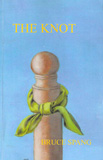August 12, 2008THE KNOT by Bruce Spang
 Review by Allen Taylor
Review by Allen Taylor
THE KNOT
by Bruce Spang
Snow Drift Press
P.O. Box 205
Bristol, ME 04539
ISBN: 0-9661678-3-X
73 pages, $10
Bruce Spang is gay. It shouldn’t matter, but it does. It matters because he wants you to know, and he goes to great pains to spell it out for you more than once. The poems in The Knot are personal, revelatory, endearing, and full of human feeling. But they aren’t brilliant.
Many of the poems in The Knot suffer from one, or a combination, of several weaknesses. For the most part, they are too vernacular. At times, as when he is discussing the care of irises or looking for Spanish Fly in his father’s armoire, this succeeds, but those successes are rare treats.
Another problem with Spang’s verse is his tendency to rely on the unimaginative “I.” Only five poems are not written in first person. Considering that many of the poems in The Knot lean toward narrative prose, that doesn’t say much for his versatility as a poet. It says even less about his ability to transcend the circle of his own synaptic sparks and approach the universal, the traditional realm of the poet. Even confessional poetry needs to, from time to time, reach beyond self-centered tropes, but Spang doesn’t stray far enough from his own experience to encourage empathy.
Even when Spang succeeds, his effectiveness is diminished by niggling nuisances such as his preference for two-line stanzas, making some of the poems seem stilted and closeted, guarded even. One-third of the poems in The Knot are written entirely in this form, but none of them are coupleted. Instead, they are written in the aforementioned vernacular, which makes them appear much less as poetry than merely streams of thought broken into lines. While those streams may be cogent and lurid, they often communicate like tree sap. The best poem in the book, the title poem, is written in this manner, which is appropriate for that poem, but it seems out of place with many of the others in The Knot.
These observations aside, Spang is not a bad poet, despite having written more than a few bad poems. The poems in The Knot are all about the exigencies of relationships, but they rely too much on the overt use of sexual references and that sometimes detracts. One would think, reading The Knot, that life was nothing more than sex, children, and a garden full of flowers. Even when he is speaking of innocence I can’t help but wonder if vague references to other topics, as in the last two lines of “Compost” —
Your brother learns about it from a book.
You get it another way.
– aren’t about sex as well. And the metaphors for human activity are overdone.
In light of Spang’s strengths, it’s almost easy to forgive his weaknesses. His attention to detail is to be praised. He sometimes likes to play with words and when he isn’t pummeling us with colloquialisms he enlightens with carefully crafted innuendo and verbal ballet. But I could do without the history lessons. They read too much like the news, or a high school textbook.
The best poems in The Knot are worth several re-readings. Sensitivity, pathos, compassion, desire, catharsis…Spang attempts to arouse and he does elicit reaction. In that regard, he is a true poet. Whether reading about Spang’s friendships, loves, relationships with his children, or the brokenness of his former marriage, some readers will find him endearing.
As prosaic as he is, Spang’s language is tight and terse. He isn’t verbose. He does make every word count and for that I give him credit. What’s more, he can traverse the murky rivers of mixed emotions with a kind of grace that most contemporary poets can only dream of, and that’s commendable as well. But The Knot lacks something that distinguishes Spang from his mentors, Tony Hoagland and Baron Wormser. It’s too much the work of a protégé.
As a sampling, the metaphorical enjambments of “Off Shipley Point” illustrate Spang’s craftiness when he’s at his best:
You can surf to eternity on faint peach
sails, tipped up, jaunty, defiant
bent on the luminous fleshof tomorrow. The exuberant spray, white envy
of water, is cast aside. It’s how fate slips from us,
slides out of the harbor, how I steered to a point,my hand hard on the rudder, keeping the wind taut
in the sail, veering in and out of the confounded air,
seeking to split the horizon, rip right through it,toward the deepest green, a faint glint of light.
The sail bulges like optimism, a white envoy caught
in a soft wind. Look how it takes the flimsy shorebreeze, grabs it, holds it, pulls
it toward a headland. It’s called Eternity:
the white hull aimed right at it.
Bruce Spang strikes me as a poet still looking for his voice. I hope he finds it by migrating to other bodies of water to sample the winds blowing from unfamiliar directions.